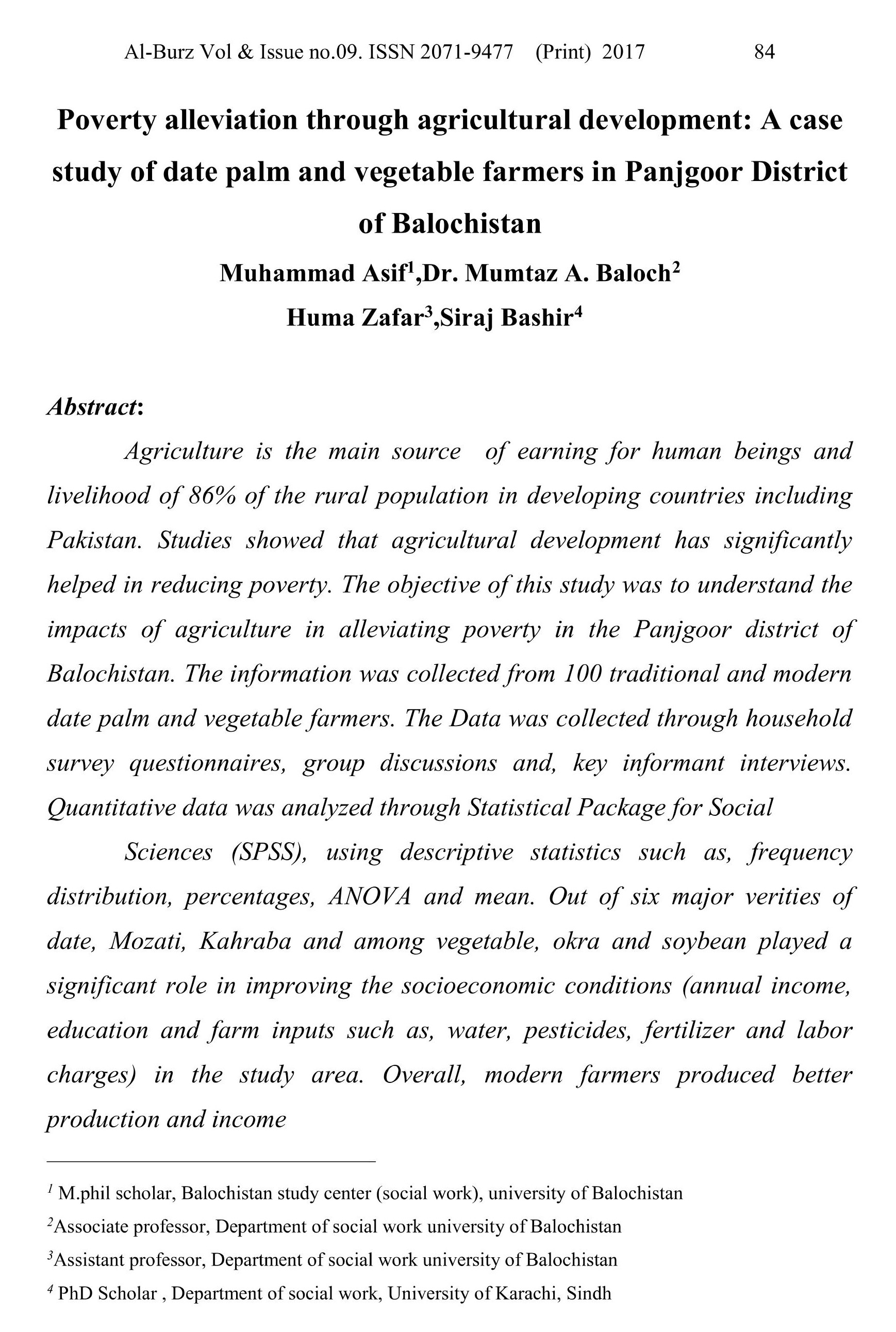Poverty alleviation through agricultural development: A case study of date palm and vegetable farmers in Panjgoor District of Balochistan
DOI:
https://doi.org/10.54781/abz.v9i1.105Keywords:
Agriculture; Poverty; Date palm; vegetable; Practices; Panjgur; BalochistanAbstract
Agriculture is the main source of earning for human beings and livelihood of 86% of the rural population in developing countries including Pakistan. Studies showed that agricultural development has significantly helped in reducing poverty. The objective of this study was to understand the impacts of agriculture in alleviating poverty in the Panjgoor district of Balochistan. The information was collected from 100 traditional and modern date palm and vegetable farmers. The Data was collected through household survey questionnaires, group discussions and, key informant interviews. Quantitative data was analyzed through Statistical Package for Social Sciences (SPSS), using descriptive statistics such as, frequency distribution, percentages, ANOVA and mean. Out of six major verities of date, Mozati, Kahraba and among vegetable, okra and soybean played a significant role in improving the socioeconomic conditions (annual income, education and farm inputs such as, water, pesticides, fertilizer and labor charges) in the study area. Overall, modern farmers produced better production and income compared to the farmers engaged in traditional farming. In modern farming practices almost all varieties of date palm and vegetable produced better yield and income compared to traditional farming practices. Findings reflected that the decreasing water volume of kariz and farmers’ poor economic conditions significantly affected the agricultural development which eventually influenced the farming practices, household income and livelihood. Insufficient inputs and common extension services could not do much in improving the agricultural practices to improve the socioeconomic conditions of small-scale farmers. There is an emerging need to rehabilitate the karizes, provide farmers with the required inputs such as, seed, technologies (trickle irrigation, pollination) grants and modern skills for agricultural development.
References
Baloch et al., 2006 M.K. Baloch, S.A. Saleem, A.K. Baloch, W.A. Baloch Impact of controlled atmosphere on the stability of Dhakki dates
Datt, Gaurav, and Martin Ravallion. "Why have some Indian states done better than others at reducing rural poverty?." Economica 65.257 (1998): 17-38.
Fan, Shenggen, Peter Hazell, and Sukhadeo Thorat. "Government spending, agricultural growth and poverty: An analysis of interlinkages in rural India."International Food Policy Research Institute, Research Report 110 (1999).
Ghicki, 2011 A.B. Ghicki Hamara Panjgur, Baloch welfare, organization, Panjgur, Balochistan.
GoB, 2008. Development Statistics of Balochistan, Bureau of Statistics Planning & Development Department, Quetta, Balochistan.
GoB, 2011. Panjgur District profile Planning & Development Department, Quetta, Balochistan.
IHS, 2011 Institute of Horticulture Science, 2011. International Symposium on Date palm: Domestication, Distribution, Production and Marketing, April, 4–5 University of Agriculture Faisalabad, Pakistan.
Machethe, Charles L. "Agriculture and poverty in South Africa: Can agriculture reduce poverty." Paper presented at the Overcoming Underdevelopment Conference held in Pretoria. Vol. 28. 2004.
Maringanti, Anant, Eric Sheppard, and Jun Zhang. "Where is the geography? World Bank's WDR 2009." Economic and Political Weekly (2009): 45-51.
PHDEB, 2008. Dates Marketing Strategy, Pakistan
Saleem et al., 2005S.A. Saleem, A.K. Baloch, M.K. Baloch, W.A.Baloch, A. GhafforrAcceleratedripening of Dhakki dates by artificial means: ripening by acetic acid and sodium chloride J. Food Eng., 70 (2005), pp. 61-66
Salifu, K. F., and V. R. Timmer. "Optimizing nitrogen loading of Picea mariana seedlings during nursery culture." Canadian Journal of Forest Research 33.7 (2003): 1287-1294.
Schneider, Kate, and Mary Kay Gugerty. "Agricultural productivity and poverty reduction: Linkages and pathways." Libraries Test Journal 1.1 (2011): 56-74.
Weaver, Catherine. Hypocrisy trap: The World Bank and the poverty of reform. Princeton University Press, 2008.

Downloads
Published
How to Cite
Issue
Section
License
Copyright (c) 2017 Authors who publish with Al-Burz journal agree to the following terms: 1. Authors retain copyright and grant the journal right of first publication with the work simultaneously licensed under a Creative Commons Attribution (CC-BY) License that allows others to share the work with an acknowledgement of the work's authorship and initial publication in this journal. 2. Authors are able to enter into separate, additional contractual arrangements for the nonexclusive distribution of the journal's published version of the work (e.g., post it to an institutional repository or publish it in a book), with an acknowledgement of its initial publication in this journal.

This work is licensed under a Creative Commons Attribution-NonCommercial-ShareAlike 4.0 International License.
Alburz has licensed under a CC Attribution-NonCommercial-ShareAlike 4.0



